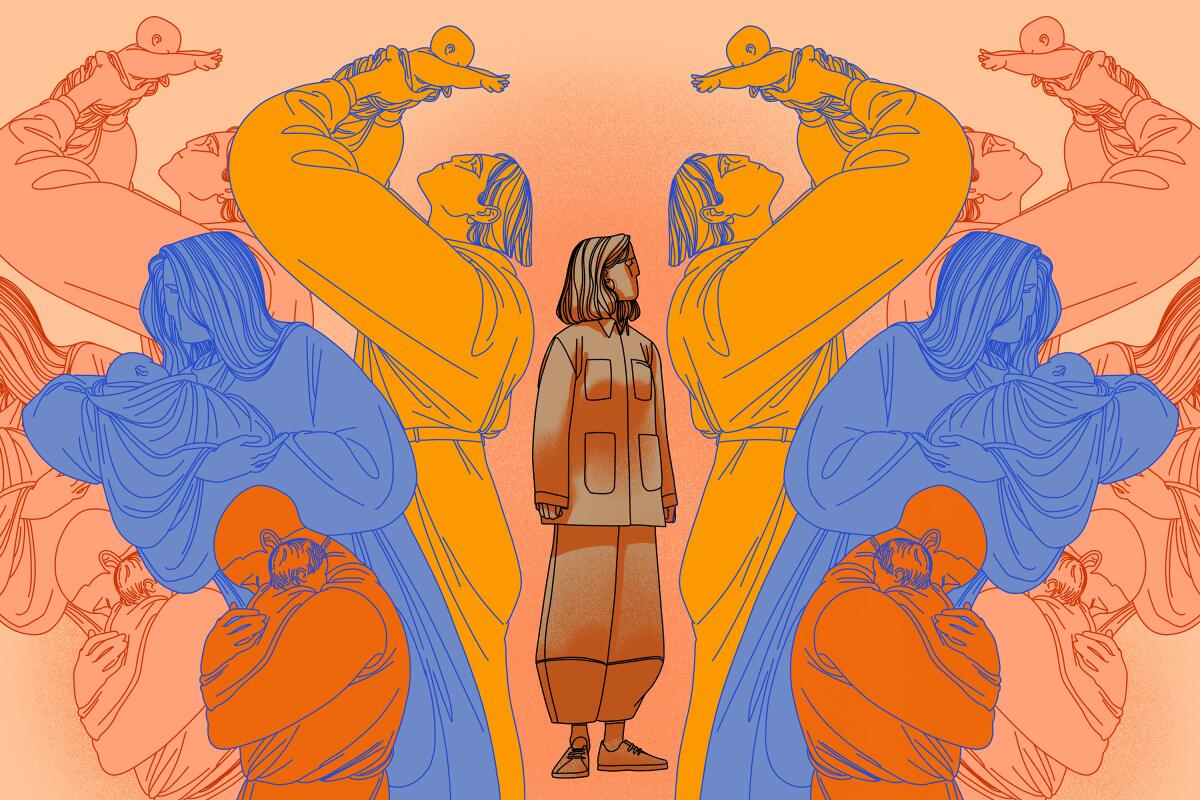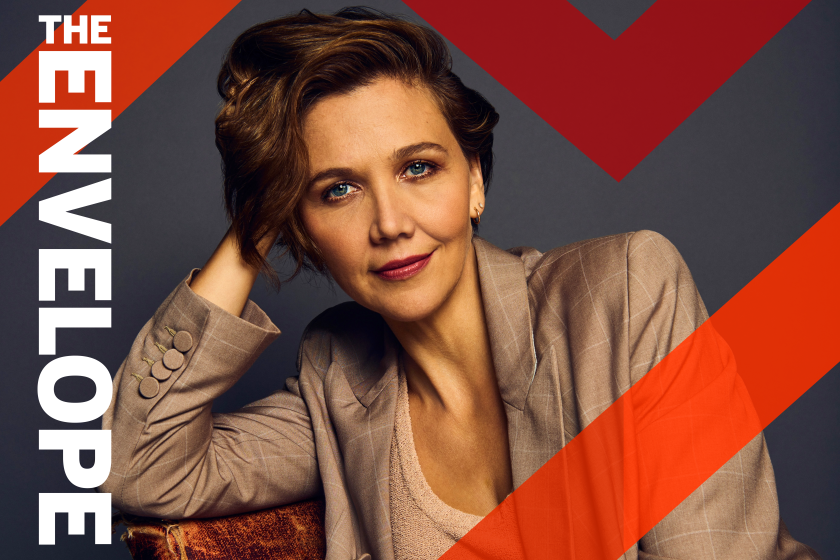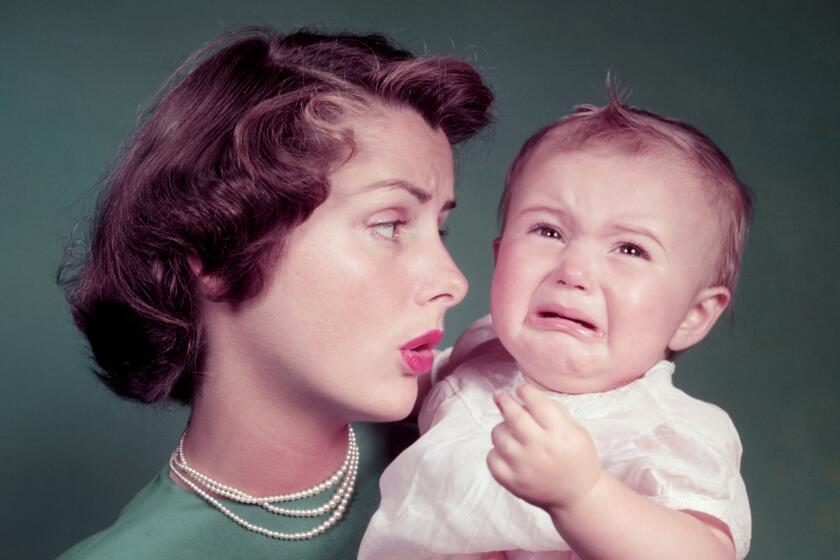I’m hungry for more stories on the ambivalence of motherhood

- Share via
In “The Lost Daughter,” a new film directed by Maggie Gyllenhaal based on the novel by Elena Ferrante, the main character, Leda calls herself an “unnatural mother.” Is an unnatural mother a woman without maternal instincts, one whose “true” nature lies outside of motherhood?
I was never drawn to having children and imagine I’d be an unnatural mother too. I understand Leda’s tumultuousness. To regret having had children, to have done it because it was expected, by one’s partner, or family or society sounds terrible. But it’s just as terrible, if not more so, to be the child damaged by that kind of regret. Leda’s daughters, Bianca and Marta, must be damaged by her.
It’s rare to see a film or read a novel that depicts ambivalence around motherhood, even rarer one that rejects that life completely, which I deeply appreciate about “The Lost Daughter.” I’m hungry for these stories. It’s important to make visible, in an honest way, a fuller spectrum of women’s experiences — of everyone’s experiences; trans men can and do give birth to children too — and to break any taboo that exists in talking about them.
Maggie Gyllenhaal discusses the “electrifying” experience that led to adapting Elena Ferrante’s “The Lost Daughter,” and the joys of finally directing.
There are plenty of people who’ve never desired children, or who have had such desires — but are forgoing it because of climate change and now the pandemic. Birthrates are down, especially among younger generations. Still, among my circles it sometimes feels the exception to be without a child. My young nephews have asked me with genuine surprise and confusion if I have a child, even though it’s clear my husband and I do not. There’s no missing cousin. They want to know why.
Sometimes I have what could be seen as “unnatural feelings” when my close friends tell me they’re having a baby. Unless I already know they’ve been trying to conceive, my first reaction has usually been shock. I’ve dutifully uttered my congratulations, which rings false because it doesn’t completely match how I feel in that moment. Though it’s the “correct” way to respond, it’s a cliché. I can’t say I completely understand the shock, since I want my friends to feel fulfilled.
In “The Lost Daughter,” Leda, a literature professor, abandons her daughters when they’re young, living apart from them for three years. My surprise at the news of a friend’s pregnancy is usually followed by a feeling of abandonment, as selfish as this might sound. It’s not in any way the same as being abandoned by a parent, but if I’m honest, I’m afraid that when a friend has a baby we’ll drift away. These feelings dissipate, but the truth is that some of these friendships do change a little. One good friend and I did grow apart, though now that her child is a little older, we’ve regained much of our closeness.
How could these friendships not be altered? Those who are mothers, or parents, often talk about how different they feel after having children, and about what a profound experience it is for them. Profound experiences remake us, and sometimes they affect the nature of our existing relationships. In addition to what is gained, there can be a kind of loss of who we once were. We don’t often acknowledge these losses and the ways in which a new reality can create a gap between people that can be hard to cross.
Until reading Sheila Heti’s novel “Motherhood,” I’d never heard anyone express these feelings. Heti describes being on an ice floe with all your friends that breaks apart bit by bit as they set off alone with their babies, leaving you on your own piece of ice. Of new parents, she writes: “Certainly I am happy for them, but I am miserable for the rest of us — for that absolute kick in the teeth, that relieved and joyful desertion. When a person has a child, they are turned towards their child. The rest of us are left in the cold.”
There’s a good reason the birthrate is declining in California and the U.S.. We’ve made parenthood way harder than it should be.
Perhaps there’s a self-centeredness in these feelings. It’s possible, however, they’re not as unnatural as I think. Heti is being playful in this passage, but she’s also being honest, and as I grow older, I crave honesty, realness. Have others felt this sense of isolation? I wonder if these unnatural feelings simply aren’t talked about, especially between friends who’ve had children and those who haven’t, because there’s a societal taboo around not only not wanting to be a mother, or being an unnatural mother or an ambivalent one, but even having a conversation about it in the first place.
I’ve never brought up these feelings with friends who are parents. Parents, especially new ones, especially now during the pandemic, are often overwhelmed. I haven’t wanted to add to that. And, though women who don’t have children are often seen as lacking “value” societally, so too have mothers been historically undervalued. Yet they’re held up as an ideal. I don’t want to devalue their experiences either. Still, I long to talk about the remaking of our friendships, not to dwell on it or live in the past, but to acknowledge the change. Maybe if we talked about this metamorphosis, we’d find communion instead of distance.
Some mothers, to my surprise, have liked or related to “The Lost Daughter” as much as I have. One friend, with a son, explained that she appreciates the resistance to and rejection of female passivity as well as the female rage she found in Ferrante’s novel. Another mother told me that she plans to watch the film with her daughter.
My imagination has been too small. Whether or not we have children, we are subject to the same types of societal expectations, the same stream of history that tries to imprint on us what it is to be a woman, what it is to be a person. And what it is to be natural or unnatural.
Amina Cain is an author in Los Angeles. Her book “A Horse at Night: On Writing” will be published in October.
More to Read
A cure for the common opinion
Get thought-provoking perspectives with our weekly newsletter.
You may occasionally receive promotional content from the Los Angeles Times.








